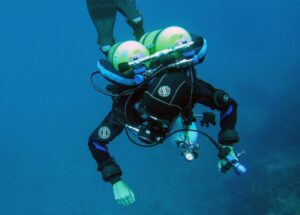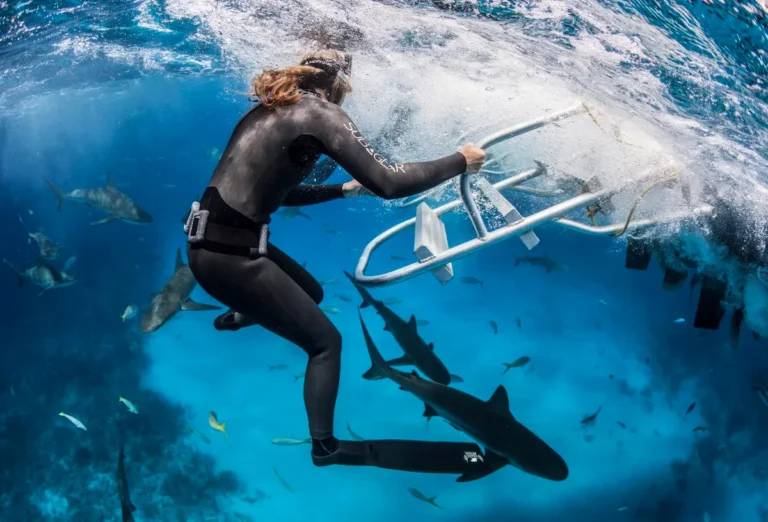Marine Conservation and Scuba Diving are two passions that merge seamlessly beneath the waves. This article delves into the world of these enthusiasts who not only explore the mysteries of the deep but also contribute significantly to the protection of our oceans. Join us as we explore this captivating synergy.
Exploring the Diversity of Marine Life
The world’s oceans cover more than 70% of the Earth’s surface and are teeming with an incredible diversity of life. From the tiniest microorganisms to massive whales, marine ecosystems are home to a staggering array of species. Coral reefs boast some of the most vibrant and intricate ecosystems on the planet, supporting a vast spectrum of marine life. In the depths of the ocean, bizarre and fascinating creatures such as anglerfish and giant squids thrive in extreme conditions. Marine biodiversity is not only awe-inspiring but also essential for the health of our planet.
Marine ecosystems are interconnected, and the variety of species found within them contributes to the overall balance of life in the oceans. Each species plays a unique role in maintaining the ecosystem’s health, from filter-feeding organisms that help purify the water to predators that control populations of prey species. Understanding this intricate web of life is crucial for the conservation and management of marine resources.
The Threats Facing Marine Ecosystems
Climate Change
Climate change is a grave threat to marine ecosystems. Rising sea temperatures lead to coral bleaching, disrupting the delicate balance of coral reefs and threatening the survival of countless marine species. Ocean acidification, caused by increased carbon dioxide absorption, harms marine life with calcium carbonate shells, such as mollusks and some plankton species. Additionally, the intensification of extreme weather events, like hurricanes and typhoons, can devastate coastal habitats.
Overfishing
Overfishing is another pressing issue. Unsustainable fishing practices, including bycatch and bottom trawling, deplete fish populations and disrupt the food chain. This not only affects fish species but also endangers other marine creatures that depend on them for food.
Pollution
Pollution, particularly from plastic waste, chemicals, and oil spills, contaminates the oceans and harms marine life. Plastic debris can be ingested by marine animals, leading to injury or death. Chemical pollutants can disrupt reproductive and developmental processes in marine organisms, while oil spills can have catastrophic immediate and long-term effects on ecosystems.
Why Marine Conservation Matters
Marine conservation is essential for various reasons. Firstly, healthy marine ecosystems provide vital ecosystem services, such as oxygen production, climate regulation, and food resources. They support the livelihoods of millions of people who depend on fishing and tourism industries. Moreover, the oceans absorb a significant portion of carbon dioxide, helping mitigate climate change.
Secondly, marine conservation is vital for preserving biodiversity. Many marine species are still undiscovered, and each loss represents a potential loss of future scientific knowledge and potential benefits to humanity.

Understanding Scuba Diving
Equipment and Training:
Scuba diving requires specialized equipment, including a mask, snorkel, fins, wetsuit or drysuit, buoyancy control device, regulator, and tanks filled with compressed air or nitrox. Proper training is essential to ensure divers understand how to use this equipment safely and effectively. Organizations like the Professional Association of Diving Instructors (PADI) offer comprehensive courses that cover diving theory, practical skills, and safety protocols.
Safety Measures:
Safety is paramount in scuba diving. Divers must adhere to strict safety measures to prevent accidents. These include pre-dive safety checks, monitoring air supply, avoiding rapid ascents, and respecting depth limits. Proper training and responsible diving practices are crucial to ensure the safety of both divers and the marine environment.
How Scuba Divers Contribute to Marine Conservation
Monitoring and Research: Scuba divers often play a pivotal role in monitoring and researching marine ecosystems. They collect data on fish populations, coral health, and other marine life, which is invaluable for scientists and conservationists. This information helps identify areas in need of protection and informs conservation strategies.
Coral Restoration Efforts:
Coral reefs are under threat from climate change and human activities. Scuba divers frequently participate in coral restoration projects, where they assist in transplanting and maintaining coral fragments. These efforts aid in the recovery of damaged reefs and promote biodiversity.
Marine Life Protection:
Scuba divers are passionate advocates for marine life protection. They engage in activities such as underwater cleanups, removing harmful debris from the ocean, and raising awareness about the impact of pollution and overfishing. Divers also promote responsible interactions with marine animals, discouraging activities that harm these creatures or their habitats.
The Ethical Code of Conduct for Scuba Divers
Scuba divers adhere to a strict ethical code of conduct. They respect marine life and ecosystems by avoiding contact with delicate coral and refraining from collecting souvenirs from the ocean. Divers prioritize environmentally friendly practices, such as using reef-safe sunscreen and minimizing their carbon footprint while traveling to dive destinations.
Scuba Diving One of Hawaii’s Most Dangerous Cliff Side for Sunken Treasure!
Case Studies of Successful Conservation Efforts
1. Coral Reef Restoration Projects
Coral reefs are among the most biodiverse ecosystems on Earth, but they face numerous threats, including climate change and overfishing. However, there are several success stories when it comes to coral reef restoration projects. One notable example is the Coral Restoration Foundation in Florida Keys, USA. They have been actively restoring coral reefs by growing and transplanting resilient coral species. Through meticulous monitoring and care, they have seen substantial regrowth in damaged reef areas, creating healthier ecosystems and bolstering local tourism.
Another remarkable success can be found in the Philippines, where the Tubbataha Reefs Natural Park has implemented strict conservation measures. These measures include regulating fishing and tourism, as well as conducting research to better understand the reefs. As a result, Tubbataha’s coral reefs have flourished, serving as a model for sustainable marine conservation worldwide.
2. Marine Protected Areas
Marine protected areas (MPAs) are essential for safeguarding marine biodiversity. The Chagos Marine Reserve, located in the Indian Ocean, is a testament to the positive impact of MPAs. Covering a vast expanse of ocean, this protected area restricts commercial fishing and other harmful activities. As a result, it has become a safe haven for numerous marine species, including endangered ones like the hawksbill turtle. The Chagos Marine Reserve underscores the significance of creating and enforcing MPAs to preserve our oceans.
The Positive Impact of Scuba Divers in These Initiatives
Scuba divers play a pivotal role in marine conservation efforts. Their firsthand experiences underwater provide valuable data and support for these initiatives. For instance, in coral reef restoration projects, divers assist in coral transplantation and maintenance. Their observations help scientists track the progress of restoration efforts and ensure the survival of transplanted corals.
Furthermore, divers often act as ambassadors for marine protection. They witness the beauty of the underwater world and are motivated to raise awareness about its fragility. Many dive operators now emphasize responsible and sustainable diving practices, educating divers about protecting fragile ecosystems and minimizing their environmental impact.
In marine protected areas, divers can serve as citizen scientists, collecting data on fish populations, coral health, and more. Their contributions aid in MPA management decisions and provide critical information for ongoing conservation efforts.
Choosing Eco-Friendly Dive Operators
When embarking on a scuba diving adventure, it’s essential to select dive operators who prioritize environmental sustainability and conservation efforts. Responsible scuba diving begins with making conscious choices right from the start.
Research and Reviews:
Start by researching dive operators in the area you plan to visit. Look for reviews and testimonials from other divers who can vouch for their eco-friendly practices.
Certifications and Affiliations:
Seek out operators that are affiliated with recognized environmental organizations like Project AWARE or the Coral Restoration Foundation. These affiliations indicate a commitment to marine conservation.
Ask Questions:
Don’t hesitate to reach out to the dive operator and ask questions about their environmental practices. Inquire about their waste disposal methods, boat engine emissions, and whether they support local conservation initiatives.
Dive Briefings:
During your pre-dive briefing, responsible operators will emphasize proper diving etiquette, including not touching or disturbing marine life and avoiding contact with delicate coral reefs. Choose operators that prioritize educating divers about responsible behavior underwater.
Sustainable Dive Practices:
Look for dive shops that adhere to sustainable practices, such as limiting the number of divers on each trip to reduce environmental impact and scheduling dives during non-peak hours to minimize disturbances to marine life.
Reducing Personal Environmental Impact
As responsible divers, we must take personal responsibility for minimizing our environmental footprint when exploring the underwater world.
Dive Gear:
Invest in high-quality, eco-friendly dive gear made from sustainable materials. Avoid disposable plastics and opt for reusable items like stainless steel water bottles.
Reduce Waste:
Bring reusable bags for your dive gear and trash, and make sure to collect any litter you encounter during your dives. Dispose of waste properly when back on the boat or on land.
Underwater Photography:
If you enjoy underwater photography, be mindful of your buoyancy and surroundings to avoid damaging fragile corals or disturbing marine life. Respect “no-touch” policies.
Buoyancy Control:
Maintain proper buoyancy control to avoid accidentally damaging the reef or stirring up sediment. Good buoyancy skills also help conserve your air supply, reducing your overall dive impact.
Participating in Conservation Initiatives
Make a positive impact on marine conservation by actively participating in initiatives and projects that protect our oceans.
Volunteer:
Many dive operators organize underwater clean-up events or coral restoration projects. Participate in these activities to directly contribute to marine conservation efforts.
Citizen Science:
Join programs that collect data on marine life, like reef health assessments or shark monitoring projects. Your observations can help researchers and conservationists.
Donations:
Support marine conservation organizations financially. Even small contributions can go a long way in funding critical research and conservation efforts.
FAQs
Can anyone become a scuba diver?
Absolutely! Scuba diving is an inclusive activity that welcomes individuals of all ages and backgrounds. Many dive centers offer certification courses for beginners.
How can I contribute to marine conservation as a diver?
You can contribute by participating in cleanup events, supporting marine conservation organizations, and practicing responsible diving to minimize your impact on the environment.
Are there any risks associated with scuba diving?
While scuba diving is generally safe, it’s essential to receive proper training and follow safety guidelines. Divers should also be aware of potential risks like decompression sickness.
How can I get involved in coral reef restoration?
Many marine conservation organizations welcome volunteers for coral restoration projects. Check with local dive shops or conservation groups to find opportunities in your area.
What is the best time for scuba diving?
The best time for scuba diving varies by location, but generally, calm seas and good visibility make for ideal diving conditions. Research the specific region you plan to dive in for optimal timing.
What marine life can I encounter while diving?
The marine life you encounter while diving depends on your location, but possibilities include colorful fish, turtles, dolphins, and even sharks. Each dive offers a unique experience.
Conclusion
Marine Conservation and Scuba Diving are a dynamic duo that showcases the beauty of our oceans and the importance of their preservation. Dive into this world, explore its wonders, and consider how you can become part of the solution. Together, we can ensure that future generations can enjoy the magic of the deep blue.
UP NEXT
The Psychology of Scuba Diving: Exploring the Mental Aspects of Underwater Adventure
Dive Safety Procedures: Ensuring Your Underwater Adventure is Risk-Free



